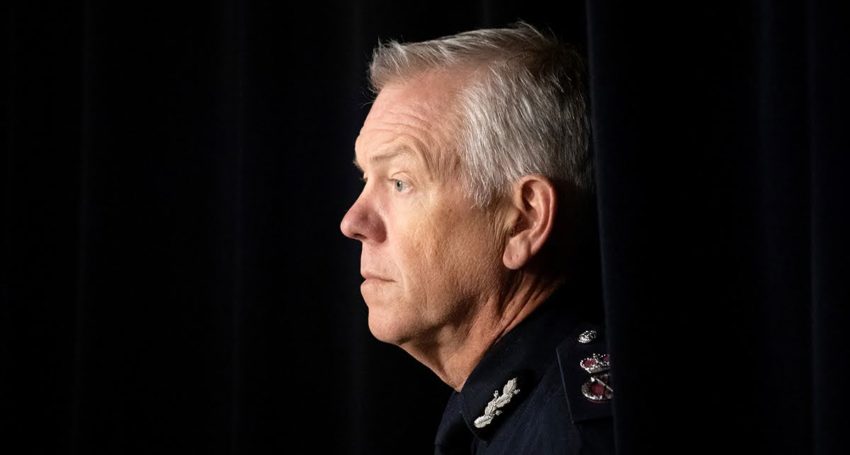‘Closed shop’: Call to open up secret police tribunal
The president of the Police Disciplinary Tribunal and a former SA police ombudsman have called for an end to the secrecy of police discipline hearings, saying there’s no reason they shouldn’t be made public – a move opposed by the police union.


Photos: Tony Lewis/InDaily. Image: Tom Aldahn/InDaily
The law governing the handling of police complaints in South Australia is being reviewed by parliament’s Crime and Public Integrity Policy Committee, which has received several submissions raising concerns about the structure of the Police Disciplinary Tribunal (PDT).
Established in 1985, the PDT is a civil tribunal tasked with handling allegations of police misconduct. If it finds a police officer committed a breach of discipline, the matter is referred to the police commissioner to determine an appropriate punishment.
Unlike disciplinary tribunals in other professions (such as legal and health services), the PDT’s proceedings and outcomes are secret, and the tribunal adheres to the same high standards of evidence as a magistrate court, which are more favourable to the accused.
There is no compelling reason why hearings should not be held in public, or why the public should not know of what behaviour that members of the police force are disciplined for and what sanctions were imposed thereafter.
South Australia is the only jurisdiction in Australia to operate a court-like tribunal for police discipline that is bound by rules of evidence.
The PDT, which sits every two months and is presided over by a magistrate, also allows police prosecutors to prosecute disciplinary cases against fellow police officers.
The Police Association of South Australia, the union which represents more than 4500 police members, has repeatedly lobbied the state government to keep the PDT system in place, arguing it is “largely responsible for the faith our members have in the disciplinary system”.
But the president of the tribunal, magistrate Simon Smart, has called for the PDT to be reformed and its proceedings made public.
He described the PDT’s adherence to strict rules of evidence as “anomalous” when compared to how other professional tribunals function, such as the Legal Practitioners Disciplinary Tribunal.
“It is important to bear in mind that the Tribunal is not engaged in determining either criminal or civil liability,” he submitted to the parliamentary committee in August.
“In the context of disciplinary proceedings, the requirement to apply the rules of evidence seems anomalous, especially having regard to the practice of other disciplinary bodies both here and interstate.”
He said there is also “no need to accord secrecy to the proceedings or the outcome of the proceedings”.
“A clear and transparent process would promote public confidence in the disciplinary process and, indeed, in the police force itself,” he wrote.
“That factor should, in my opinion, outweigh any embarrassment to individual police officers.”
Smart’s comments followed a submission from former acting SA Police ombudsman Michael Grant, who labelled the PDT a “closed shop” and called for police disciplinary matters to be heard openly by the South Australian Civil and Administrative Tribunal (SACAT).
He said the practices and procedures of the Magistrates Court are “not an appropriate model for hearing and determining disciplinary proceedings”.
“There is no compelling argument as to why the procedures under which disciplinary proceedings against members of the South Australian Police Force should be different to those applying widely across other professions and indeed to other Police Forces within Australia,” he wrote to the committee.
“Equally, there is no compelling reason why hearings should not be held in public, or why the public should not know of what behaviour that members of the police force are disciplined for and what sanctions were imposed thereafter.”
Grant, who worked as a police officer for 24 years before becoming a legal practitioner in 1990, also criticised the PDT for permitting police prosecutors to prosecute disciplinary matters, arguing this creates “an obvious perceived conflict of interest”.
“Police who prosecute police disciplinary proceedings not only prosecute fellow police officers but also fellow police unionists… and this itself may give rise to a perception of bias or partiality in favour of the police officer and against the complainant,” Grant wrote.
“That role should be occupied by legal practitioners who are independent of the police force – such as those employed within the office of the Crown Solicitor.”
Magistrate Smart agreed with Grant that responsibility for prosecuting police disciplinary matters should be within the Crown Solicitors Office to eliminate potential perceptions of bias from civilian witnesses.
He said his experience presiding over the tribunal was that police prosecutors “are not legally trained” and “have difficulty with the framing of charges and struggle with legal argument”.
“This makes the work of the Tribunal more difficult,” Smart wrote.
Malinauskas Govt to wait for committee recommendations

Attorney General Kyam Maher is responsible for the Act which governs the PDT. Photo: Tony Lewis/InDaily
InDaily asked the office of Attorney General Kyam Maher, the minister responsible for the Police Complaints and Discipline Act 2016, whether he was supportive of removing the secrecy provisions of the PDT, or ending the practice of police prosecutors prosecuting police disciplinary matters.
A government spokesperson responded: “The Government will await the committee’s findings before determining what action may be required.”
The Act has been reviewed twice previously, including a major review handed down in 2020 by judge Gordon Barrett QC.
Among Barrett’s 35 recommendations was to establish an “abbreviated disciplinary proceeding” – an informal pre-trial process used in Queensland – to expediate the resolution of misconduct cases that would typically come before the PDT.
Barrett also recommended the Act be amended to require the police commissioner to make a media statement if the PDT finds a police officer committed misconduct.
The statement would not be required to reveal the officer’s name but detail their age, gender, rank, branch/section, the nature of their misconduct and the sanction applied.
Neither of these recommendations were acted on by the former Marshall Government and no amendments were made to the Act arising from the review.
Police union, SAPOL reject lifting ‘secrecy regime’

Police commissioner Grant Stevens is opposed to lifting the secrecy provisions of the Police Complaints and Discipline Act 2016, arguing it would “deny police the same protections afforded to other South Australian public sector employees”. Photo: Tony Lewis/InDaily
The state’s police union has historically been the most vocal supporter of the PDT and has submitted opposition to changing the system in all three reviews of the Act.
In a February 2020 submission to Judge Barrett’s review, Police Association of SA president Mark Carroll said the union is “a very strong supporter of the PDT” and the tribunal “plays a large role in proving our members confidence in the disciplinary system”.
“Previous governments have argued that reform of South Australian government boards and committees including the Police Disciplinary Tribunal should be abolished and its duties allocated into the South Australian Civil Administrative Tribunal (SACAT),” he wrote in 2020.
“PASA strongly opposed this and was successful in maintaining the PDT.
“We think this system is the best in Australia and we strongly support maintaining it in its present form.”
It would be dangerous if the secrecy provisions are abolished and allegations are allowed to become fodder of prurient interest for the media.
He also said criticism of the PDT is “usually by those who have failed to successfully prosecute discipline matters in it”.
In his latest submission in August 2022, Carroll said the jurisdiction of the PDT “should be expanded” and SAPOL needed more resources to shorten delays in police disciplinary processes.

Police Association of SA president Mark Carroll.
He also reiterated to the parliamentary committee the union’s opposition to lifting the secrecy provisions of the Act or compelling the police commissioner to publish anonymised media statements about disciplinary outcomes.
“The Association submits there is no reason, good or otherwise, for such an amendment,” Carroll wrote in August.
“The publication of details pertaining to disciplinary matters involving designated officers should remain a matter for the exercise of the discretion of the Commissioner for Police.”
Carroll had submitted to Barrett’s review that lifting the “secrecy regime” of the Act would “condemn police officers to public exposure” and “make them and their families targets for social media trolls and other haters”.
“We are concerned that if the secrecy regime is dismantled, the effect will be to deter potential recruits on the one hand, and complainants from complaining on the other,” he wrote in 2020.
“Ultimately, in our respectful view it would be dangerous if the secrecy provisions are abolished and allegations are allowed to become fodder of prurient interest for the media.”
But Grant, the former acting SA Police ombudsman, said the police union was a “partisan player” on the issue of police discipline.
“The Police Association, in my experience, is very happy with the way the PDT function. That of itself should be food for thought,” Grant wrote in August.
“[The association] is not well placed to assess whether the structure of a police disciplinary framework is in the public interest and does the job of protecting the public and the police force itself.
“Rather its focus is primarily if not totally on the best interests of its members. That focus, while admirable in itself, may not be as clear when the issue is what is in the best interests of the public.”
Police commissioner Grant Stevens has submitted to the committee that he would be “open to a re-evaluation of [the PDT’s] operations and the consideration of alternative processes”.
“The PDT is a complex system prone to lengthy adjournments and long timeframes to conclude a matter,” Stevens wrote to the committee August.
“In my view it is unduly legalistic and by its very nature not always predisposed to timely resolution of what is, essentially, an employer/employee matter.”
He said he would prefer a system with a more “informal process” that “still permits sanctions up to and including termination”.
However, he rejected that disciplinary proceedings should be made public, arguing that “we must remember these are ultimately matters relating to the employee/employer relationship”.
“Whilst outcomes of disciplinary proceedings are reported in general terms, the naming of involved officers (or publishing of information that might tend to identify them) would deny police the same protections afforded to other South Australian public sector employees,” Stevens wrote.
“It should be noted the more serious matters proceeding to a criminal prosecution are made public, as is the case for anyone in the community.”
Stevens is due to appear before the parliamentary committee on Friday along with assistant commissioner Philip Newitt, superintendent Simon Watkins and sergeant Greg Merrett.




